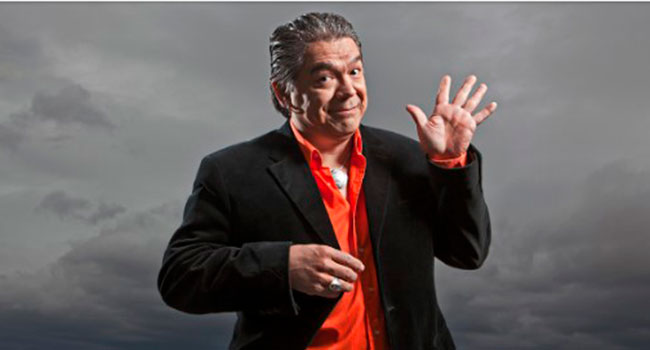Lorne Cardinal turned down a role in the popular television series North of 60 to attend theatre school.
His agent thought he was crazy to pass on such a marquee opportunity. But Cardinal’s acting coach in Kamloops, Dave Edwards, told him nothing was more important than training if he wanted to make a career of it.
So he opted for the U of A’s celebrated BFA acting program in the Faculty of Arts in the fall of 1990, the first-ever Indigenous student to be admitted.
“It was the best three years I ever invested in myself,” said the Cree native of Sucker Creek, Alta., who now makes his home in Squamish, B.C.
“It’s paid itself off numerous times – the technique and craft they teach at the U of A are second to none. I never looked back.”

Best known for his role as the affable Sergeant Davis on Corner Gas, U of A alumnus Lorne Cardinal has more than 100 film, television and stage credits on his resume.
After graduating in 1993, Cardinal quickly landed a number of gigs, among them a minor role on North of 60 as “drunk card player number one.” The show’s producers liked what they saw and brought him back – this time with an actual name, Daniel, and then a third time with three kids.
His career took off from there. Best known for his role as the affable Sgt. Davis Quinton on Corner Gas, he has more than 100 film, television and stage credits on his resume.
He is a regular on FBI’s Most Wanted on CBS and has a role in the Peabody Award-winning Molly of Denali on PBS Kids. It’s the first animated children’s show in America with an Indigenous lead character. Then there’s voice work on the animated reboot of Corner Gas.
Over the years he’s performed with Al Pacino in Insomnia (shot partly in Squamish), Susan Sarandon in Icebound and Scotland’s Shirley Henderson in Never Steady, Never Still.
In recognition of this stellar career, Cardinal received the prestigious August Schellenberg Award of Excellence earlier this month from the Toronto-based ImagineNATIVE Film + Media Arts Festival. It’s the world’s largest Indigenous film and media arts festival.
It’s been a good month for Cardinal. Theatre Network’s Roxy Theatre in Edmonton also announced it would name a theatre space in his honour when it reopens early next year.
Established in 2015 and named after the legendary Canadian actor, the Schellenberg Award has been handed out to the likes of Tantoo Cardinal, Tom Jackson and Tina Keeper.
What made it all the sweeter for Cardinal was that “Augie” was a cherished friend and mentor whose talent and respectful demeanor guided Cardinal on his own path. They worked together three times – on the series Lonesome Dove and Crazy Horse, and on a stage version of King Lear.
“To be even thought of in his realm is an honour in itself, because Augie had a high work ethic and professional standards, and expected you to follow along.,” said Cardinal. “He didn’t suffer fools gladly.”
The 2015 all-Indigenous production of King Lear at the National Arts Centre was a highlight of Cardinal’s career, the first all-Indigenous stage production at an “A house” in Canadian history.
While playing the role of Albany and serving as assistant director, Cardinal also produced a documentary film on the production, called Chasing Lear, with his wife – producer, writer and comedian Monique Hurteau.
“Augie hadn’t been on (the National Arts Centre stage) since he opened the building in 1967 with the Ecstasy of Rita Joe,” said Cardinal. “Playing Lear was a dream he’d had for 40 years – it turned out to be his last performance.”
Alex Hawkins, Cardinal’s theatre history instructor at the U of A, said “it joys my heart to see that one of our most successful graduates has been honoured with the Schellenberg Award.”
Hawkins points to the 2016 film God’s Acre – described as “the story of an older Aboriginal man being forced to adapt to a constantly changing world” – as a pinnacle performance for Cardinal, “almost a one-man film that showed Lorne’s prodigious range as an actor.”
Throughout his career, Cardinal has resisted Indigenous roles that lack depth, come off as stereotypical or, as he puts it, feature “a screaming eagle every time I come out.
“I try to make my characters – Indigenous or not – as three-dimensional as possible … and I have turned stuff down. When I was doing Corner Gas, I got offered a lot of stage work TV shows but it was all in the comedy vein, so I said no.
“Why should I just play this part when I can play another (non-Indigenous) part and bring more to it?”
To escape the inevitable pressure of typecasting, he took on Sam Shepard’s True West at Theatre Network in 2006.
“I made a complete 180 from what I was playing to exercise another side of me, another part of my acting muscles … I don’t want to keep getting caught in that pigeonhole.”
Whenever Cardinal struggles to find his way into a role, he thinks back to lessons learned at the U of A – “starting with the words, the script, then just mining my way through it, picking out little things” to connect with.
“There’s so many times when I’ve just relied on my technique, the craft that I learned from instructors like Jim DeFelice and Tommy Peacocke.
“It’s just the stillness, getting yourself grounded, acting less and breathing more.”
| By Geoff McMaster
This article was submitted by the University of Alberta’s online publication Folio, a Troy Media content provider partner.
The views, opinions and positions expressed by columnists and contributors are the author’s alone. They do not inherently or expressly reflect the views, opinions and/or positions of our publication.

